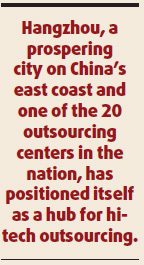

Yu Xiaolan, who majored electronics engineering, just got a job offer from an outsourcing company in Hangzhou and what surprised her most was a free practical training course offered as part of the local government's policies to support service outsourcing.
Hangzhou, a prospering city on China's east coast and one of the 20 outsourcing centers in the nation, has positioned itself as a hub for hi-tech outsourcing.
Hangzhou's software and outsourcing industries generated 39.7 billion yuan in 2008, up 16 percent over 2007, with offshore outsourcing revenue reaching $2 million, an 81 percent increase over 2007, according to statistics recently released by the Hangzhou External Economic and Trade Bureau (HEETB).
Cai Qi, mayor of Hangzhou, said service outsourcing is becoming a new green engine for the city's economic development.
He said the city's service outsourcing and software are expected to generate 56 billion yuan in revenue by 2010.
Liu Shufeng, executive CEO of Hundsun, a local IT company that accounts for 80 percent of China securities outsourcing work, says the Internet revolution has spurred financial outsourcing.
"The revenue of Hundsun increased 20 percent in the first quarter compared to the same period last year and our net profit surged 60 percent despite the economic slowdown," he said.
"The financial industry has been changed by the Internet. It is a sunrise industry that will continue to grow."
For its part, Hangzhou's government has increased the supply of outsourcing talent, training 20,000 people a year for free. It also established the first undergraduate institution for service outsourcing in China.
"Training is Hangzhou's hole card in the outsourcing industry," said Cai.

"The primary thing that our customers need is talent, asking 'can we provide them the talent they want?' Otherwise, there is no way to attract them," Cai said.
Hangzhou also accelerated construction of service outsourcing parks and formulated regulations empowering the local government to protect intellectual property rights in service outsourcing.
Microsoft signed contracts with the Hangzhou local government in May 2009 to build two new technology centers and make other investments in Hangzhou, where city officials say intellectual property has greater protection than elsewhere in China.
The software giant said piracy fears are at the top of the list of concerns for technology companies when they consider business in China, so it is in Hangzhou's interests to stand out.
Li Ling, director of HEETB, said Hangzhou has an advantage in attracting international talent as the city is a model of Chinese urban planning, mixing beautiful scenic attractions and modern commercial centers.
"That also attracts high-level professionals, especially their wives," she said, noting that international schools and medical centers are important as well.
She also sees Hangzhou's location as a big advantage.
"If you draw a circle with Hangzhou at the center, it will include all the major cities in Yangtze River Delta Region in a two and half hour drive," she said.
"The area with a population of 200 million people has an active economy and strong purchasing ability."
Forbes magazine ranked the city as the top location for business on the mainland for five consecutive years, from 2004 to 2008.
The environment drew Ascendas, one of Asia's largest developers of business parks, to Hangzhou in 2007 to jointly develop a $458 million IT Park with the Hangzhou Economic Development Area.
Singapore's Prime Minister Lee Hsien Loong opened the $484 million Singapore-Hangzhou Science and Technology Park on June 5th.
In the heart of the Hangzhou Economic Development Area, it has positioned itself as a hub for service industries including financial services and IT outsourcing and IT. Phase one of the project will open next month.
Because of Hangzhou's quality financial environment and location, city fathers say it has the right conditions to become the back office of Shanghai.
Government support was also a key reason for Ascendas to develop its IT Park in Hangzhou, the company says, with the local government accounting for 20 percent of the total investment.
Li says Hangzhou plans to establish a 1 billion yuan fund this year for software, new energy and other hi-tech startups, 20 percent of which will be used for outsourcing firms.
(China Daily 06/15/2009 page10)













